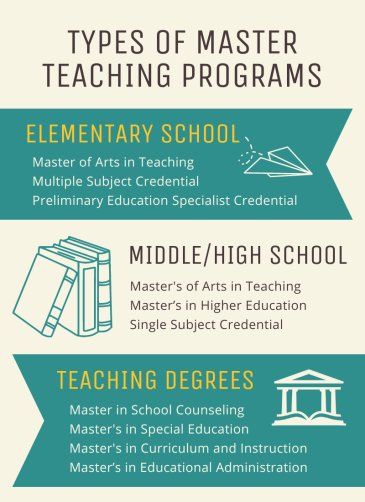
Pursuing a career in education can yield lifelong benefits for teachers and students alike. From working in elementary school to working at a junior college, you can have an impact on the educational journeys of many students. Earning a master’s degree in education can set you apart as a teacher and expand your career opportunities and salary earnings.
The National Center for Education Statistics shows how, as of 2019, 56.6 million K-12 students attended public and private schools. Earning your master’s degree in education or teaching can provide you with opportunities to make a difference in the lives of countless students. Even though there are 3.7 million K-12 teachers across the U.S., the country faces a shortage of over 110,000 teachers. If you are considering entering the teaching profession, now is an ideal time, as teachers are in high demand.
Does a Master’s Degree Increase a Teacher’s Salary?
In most occupations, you can usually see an increase in salary based on your experience and education. If you devote yourself to becoming an expert in your field, you will almost always have a higher salary than those who are new to the job. The same is true for professionals working in the field of education.
If you devote yourself to becoming an expert in your field, you will almost always have a higher salary than those who are new to the job.
The National Center for Education Statistics shows the average national salary for teachers working in public schools, by highest degree earned and years of teaching experience. The statistics reveal that, on average, educators with a master’s degree earn a higher salary than their fellow teachers with a bachelor’s degree, even if they have the same amount of experience. For example, even if two teachers both have six to nine years of experience, a teacher with a bachelor’s degree will earn $45,390 while a teacher with a master’s degree will earn $52,750, according to the National Center for Education Statistics.
__________
Experience life-changing education.
Pursue your purpose at PLNU.
__________
Teaching Graduate Degrees
While the National Center for Education Statistics demonstrates the national average for teachers in the U.S., salaries often vary from state to state. However, while teachers may not have the same earning potential based on their geographic location, most teachers in the U.S. can increase their salaries by pursuing a graduate teaching degree.
According to the National Council on Teacher Quality, “On average, a master’s degree earns teachers an additional $2,760 in their first year of teaching compared to a bachelor’s degree. This salary advantage expands to an average of $7,358 per year by the time a teacher reaches the maximum point of the pay scale.” Overall, if you want to increase your salary earnings throughout your career as a teacher, you can do so through earning an advanced education degree.
The National Council on Teacher Quality also collected data regarding teacher salaries across the largest districts in the country. According to their findings, 88 of the country’s biggest districts increase the salaries of teachers who earn a master’s degree. While some school districts in the country do not seem to pay their teachers based on their levels of education, teachers across the country with master’s degrees tend to earn a higher annual salary than teachers with bachelor’s degrees.
Careers in Education
Even though most teachers with a master’s degree typically earn a higher salary, your annual salary can depend on what teaching job you choose. According to the Bureau of Labor Statistics, kindergarten and elementary school teachers across the U.S. make an annual median salary of $59,420, with a bachelor’s degree.
If you are working at the elementary level, you usually need to earn a bachelor’s degree as well as go through a student teaching program and earn a multiple-subject credential. Middle school teachers with a bachelor’s degree across the country have a similar income to elementary school teachers, according to the Bureau of Labor Statistics, earning an annual median salary of $59,660.
Working in secondary education, as a high school teacher, can be a particularly rewarding career. If you are interested in teaching at the high school level, the Bureau of Labor Statistics shows how teachers across the U.S. earn an annual median salary of $61,660, with a bachelor’s degree. As a prospective high school teacher, you would need to begin by earning a bachelor’s degree. You would then earn a single-subject credential in your area of study. Earning a master’s degree in teaching, education, or your specific subject would then help you advance your career as a high school teacher.
Working in secondary education, as a high school teacher, can be a particularly rewarding career.
If you have considered working in a postsecondary environment, such as a junior college, technical college, or professional school, you are going to need to further your education with a graduate degree in teaching. While most teaching positions in colleges and universities require a doctoral degree, you can pursue a rewarding teaching career at a junior college or similar institution, with a master’s degree. The annual median salary for postsecondary teachers is $79,540, and educators need a master’s or doctoral degree to work in these positions.
Different Types of Master Teaching Programs
Depending on what career in education you want to pursue, you may need to explore different master’s in education programs.

Elementary School Teacher
If you are considering working as an elementary school teacher, you may want to earn a Master of Arts in Teaching degree with a Multiple Subject Credential and/or a Preliminary Education Specialist Credential. Since you will be teaching multiple subjects in your classroom, pursuing a degree in education can equip you with a stronger foundation of knowledge. Also, according to the Houston Chronicle, earning an advanced education degree can increase your salary, as “about 42 percent of elementary education undergraduates obtained graduate degrees for a 36 percent boost in salaries.”
Middle or High School Teacher
If you are a prospective middle school or high school teacher, you can also enhance your knowledge in your field of study as well as expand your career horizons, by earning a teaching graduate degree with a Single Subject Credential. A Master of Arts in Teaching can prepare you for a variety of careers, from mathematics to literature.
Pursuing a master’s degree can be essential for a career in higher education, if that is the route you are choosing. Whether your goal is to teach at a junior college or gain teaching experience before earning a doctoral degree and teaching at a university, a graduate degree, i.e. a Master's in Higher Education, is usually necessary. If you are pursuing a doctoral degree in education, earn a Masters of Science (M.S.) degree. The Master of Science degree prepares you for future scholarship in an area of interest.
Teaching Degrees
When you choose a master’s program, choose a degree that helps you move towards your career goals. You may hope to help your students reach their full academic and spiritual potential and therefore choose to work toward a Master's in School Counseling.
You can also pursue a Master's in Curriculum and Instruction to distinguish you from your fellow educators. Whether you work as a teacher in elementary, middle, or high school, leadership qualities with education expertise can set you apart.
Maybe administrative aspects of the education field appeal to you more than other specialties. If so, you can earn your Master’s in Educational Administration. Having a foundation in administrative principles can give you an advantage in the field, especially if you want to eventually pursue a career as a principal, curriculum specialist, college counselor, or university registrar.
If you have a passion for working with students with special needs, consider pursuing a Master's in Special Education.
Advance Your Education
Pursuing a teaching graduate degree with different concentration options can lead to a rewarding teaching career. If you are looking into San Diego teaching programs, discover how Point Loma Nazarene University’s Master of Arts in Teaching program can prepare you with its specialized courses and distinguished faculty members. You can also explore a variety of Master's programs throughout our graduate School of Education programs.
